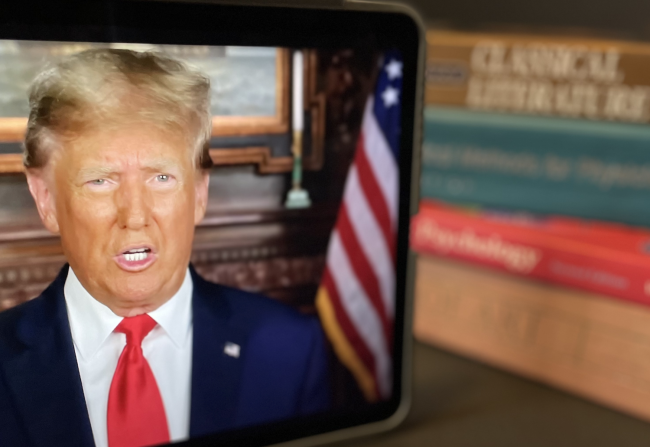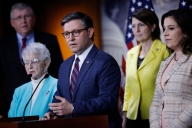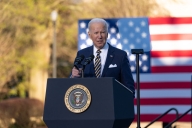You have /5 articles left.
Sign up for a free account or log in.

Former president Trump said in a campaign video that he would reclaim colleges and universities from the “radical Left.”
David Ho/Inside Higher Ed
If former president Donald Trump returns to the White House, he plans to replace college accreditors and impose new standards on the nation’s colleges and universities that include removing diversity, equity and inclusion staff members; protecting free speech; and “defending the American tradition and Western civilization.”
Trump said in a campaign video this week that his plan would reclaim colleges and universities from the “radical Left.” The new standards also include entrance and exit exams to gauge student learning and requiring the colleges offer “options for accelerated and low-cost degrees.”
“Our secret weapon will be the college accreditation system,” he said. “It’s called accreditation for a reason. The accreditors are supposed to ensure that schools are not ripping off students and taxpayers, but they have failed totally.”
Accreditors and other experts said that Trump’s plan would interfere with bedrock principles in higher education, threaten the federal accountability system for higher education and stands little chance of being carried out, given that it would likely require Congress to reauthorize the Higher Education Act of 1965, which hasn’t been updated since 2008.
Trump’s plan spotlights a key cog in the federal higher education accountability machine that’s not typically a topic in presidential campaigns. Colleges and universities have to be accredited by an Education Department–recognized accreditor in order to receive federal student aid, according to U.S. law, so the accrediting agencies serve as gatekeepers to the money. In recent years, some of the institutional accreditors have spoken against state lawmakers’ efforts to reshape higher education.
Some Republicans such as Florida Governor Ron DeSantis have long focused on accreditation as a problem.
Presidents (and ex-presidents) of several accreditation agencies said preserving the independence of their agencies is key and that they have regularly worked with different presidential administrations to help institutions improve.
“It’s a bedrock principle that the federal government doesn’t tell colleges what to teach,” said Jamienne Studley, president of the Western Association of Schools and Colleges Senior College and University Commission and chairwoman of the Council of Regional Accrediting Commissions.
Studley said that accreditors already focus on student success in their review of institutions and serve as a neutral referee. They also set minimum quality standards and ensure that institutions are doing what they say they are doing. But, she said, accreditors don’t tell institutions what to teach.
To Studley, who worked in Education Department during the Clinton and Obama administrations and helped to developed the College Scorecard, the debate isn’t about accreditation itself.
“Accreditation and higher education have become a battleground for larger issues,” she said. “My hope is that it will not undercut the important values that have served American higher education for so long and that we can continue to respect the diversity of institutions that we have honored for so long.”
Trump’s plan also would fine college and university endowments if they are found to have engaged in “unlawful discrimination under the guise of equity.”
“Colleges have gotten hundreds of billions from hardworking taxpayers, and now we are going to get this anti-American insanity out of our institutions once and for all,” Trump said. “We’re going to have real education in America.”
The focus on accreditation is a shift for the former president, who didn’t have many formal higher education plans when in the White House. His administration did relax the rules for accrediting agencies in 2019, along with other regulatory changes that focused on undoing Obama-era policies.
“It’s strong rhetoric,” said Michelle Dimino, deputy director of education at Third Way, a center-left think tank. “It’s not reflective of an understanding of how these issues actually work from a legislative or regulatory standpoint. Zooming out, this is a president who didn’t have a strong higher ed policy focus or agenda when he was in office, so it’s a strange shift in tune to state all these priorities.”
Dimino said the plan was “fairly bizarre and disconnected from reality.”
“Comments like these show a lack of understanding for how accreditation works and are an attempt to weaponize that process in a way that is fairly odd,” she said.
The video also is the latest signal that higher education will likely play a greater role in the 2024 presidential campaign than it has in recent election cycles.
House Republicans have put a spotlight on several issues such as student loans and free speech since taking control of the chamber in January, and an increasing number of state legislatures have moved to restrict colleges’ diversity, equity and inclusion efforts.
Florida governor Ron DeSantis, a likely contender for the Republican nomination, has waged a years-long campaign to remake higher education in the Sunshine State. That includes requiring universities and colleges to change accreditors every 10 years; attempting to defund diversity, equity and inclusion efforts; and amending hiring policies. More recently, DeSantis overhauled the New College of Florida’s Board of Trustees in a bid to remake the liberal arts institution to fit a more conservative vision of higher education.
“It does seem that it is an across-the-board effort from Republican candidates to position higher education squarely in the center of the culture wars,” Dimino said. “That’s a challenging position to navigate, as federal policy advocates really focus on what changes are within their purview at the federal level.”
DeSantis has not yet declared his candidacy for the 2024 presidential election.
“It looks like Trump is trying to out-DeSantis DeSantis himself,” said Barbara Brittingham, former president of the New England Commission on Higher Education.
Brittingham pointed out that overhauling accreditation would be more complicated than Trump’s statements suggest.
Because colleges and universities must be accredited by an Education Department–recognized accreditor in order to receive federal student aid, the department reviews accreditors as part of a recognition process that takes place on a five-year cycle. That process involves a lengthy review and an advisory committee. The regulations that the department uses to recognize accreditors are from the Higher Education Act.
Additionally, the administration would have to help get other accreditors off the ground to replace the “fired” entities, contend with lawsuits and create the entrance and exit exams that Trump called for.
“It doesn’t strike me as practical,” Brittingham said.
Judith Eaton, former president of the Council for Higher Education Accreditation, said Trump’s comments echo concerns about accreditation that aren’t new.
“It’s extremely unusual for accreditation to rise to the level of a presidential campaign and become a campaign issue,” she said.
Eaton noted that she’s been concerned over the years about the federal government increasing its oversight of the accreditation system.
“The price of that was losing some of the independence of accreditation and institutional autonomy and academic freedom being diminished at our colleges and universities,” she said.
Sonny Ramaswamy, president of the Northwest Commission on Colleges and Universities, said accrediting agencies are constantly reinventing themselves.
“The formerly regional accreditors have been around for well over 100 years,” he said. “We’re not sticks in the mud.”
The focus on accreditation as a political issue seems “brand-new,” and he sees it as a backlash to the 2020 reckoning over racial justice.
“Students are caught in the middle,” he said.








